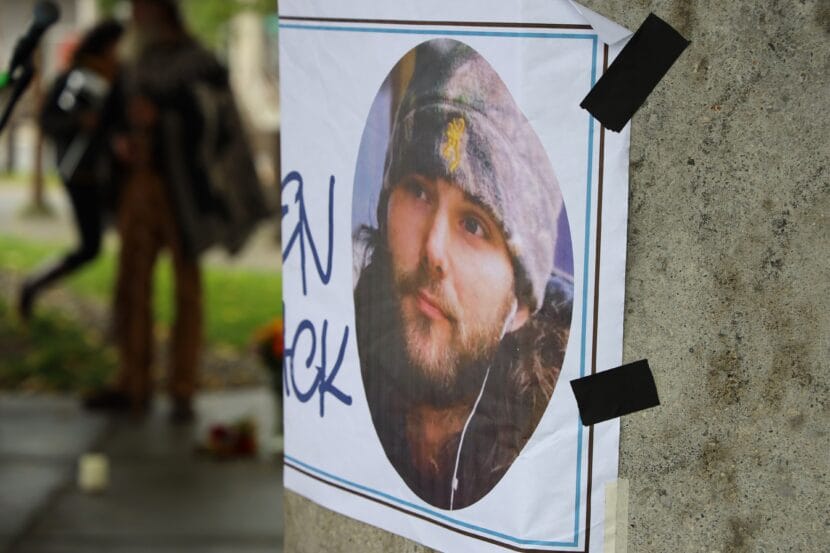
The two law enforcement officers who shot and killed a Juneau man who they say lunged at them with a knife during a standoff earlier this summer will not face criminal charges.
The state’s Office of Special Prosecutions released a letter Tuesday clearing Juneau Police Department Sgt. Chris Gifford and Alaska Wildlife Trooper Sgt. Branden Forst in the July 15 shooting of 35-year-old Steven Kissack.
In an interview with JPD Chief Derek Bos, he said he was not surprised with the state’s findings.
“Ultimately it was not the outcome we all want, but Steve Kissack was the one who dictated the circumstances and he’s the one who had the final say as to how it turned out,” he said.
Three other JPD officers were also present at the incident but did not fire their weapons. JPD also released the officers’ camera footage from the incident on Tuesday. All of the officers returned to duty in Juneau following a short administrative leave after the shooting.
Kissack was a member of Juneau’s unhoused community and well-known by many people downtown. He was often seen with his dog, Juno. According to social media posts by Juneau Animal Rescue, Juno has since been adopted by a new owner.
According to JPD, Kissack was first approached by a police officer on July 15 when he was sitting in a doorway on Front Street. Police say the officer questioned Kissack about an alleged assault he was involved in that had happened the day before. Officers deployed non-lethal rounds at Kissack before he was ultimately shot as he moved towards one of the officers holding a knife.
“When Mr. Kissack, with the knife still in hand, quickly moved towards an officer who attempted to retreat, it was objectively reasonable for Sgt. Forst and Sgt. Gifford to believe that he posed an imminent threat of death or serious physical injury to that officer, and other officers and civilians,” the state’s letter reads. “It was also reasonable to believe that Mr. Kissack presented a danger to others if he was not arrested or stopped.”
Kissack’s death sparked public outcry, vigils and protests by Juneau residents. His interaction with police happened on Front Street in downtown Juneau in the middle of the day, and multiple videos of the incident were shared on social media at the time.
Since then, residents have called on the police department and Juneau Assembly for more accountability and to increase support for mental health services for unhoused people.
The release of the body camera footage comes 57 days after Kissack’s death. The Anchorage Police Department recently announced a new policy that body camera footage of police shootings must be released within 45 days. That decision came after a string of officer-involved shootings.
Right now, JPD’s policies do not have a timeline for when body camera footage is released to the public. But, Bos said JPD wants to update its policies in the next few months.
“I would very much like to get body camera footage released faster. This was a bit of a challenge because there was multiple agencies involved and trying to navigate that,” he said.
Juneau City Attorney Emily Wright said the Juneau Assembly would then need to approve the change for it to go into effect.
JPD had previously said Kissack’s family would review the footage before it was released publicly. Three of his siblings visited Juneau last month from Florida, where he was originally from. They said at the time that they wanted more information from police about the circumstances that led to their brother’s death.
In a statement shared with KTOO by his sister, Dawn Kissack, the family asked for space.
“Our family needs time to process all this and we need time to collect ourselves and our thoughts,” she wrote.
This story has been updated with additional information from the Juneau Police Department and Steven Kissack’s family and a copy of the letter from the Office of Special Prosecutions.